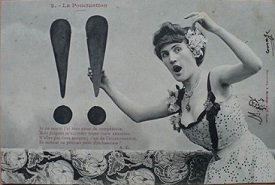Call for papersConference « Exclamation and intersubjectivity »
Université Nice-Sophia Antipolis CNRS, UMR 7320 « Bases, Corpus, Langage » Campus Saint-Jean d’Angély Bâtiment de l’horloge 24, avenue des diables bleus 06357 Nice Cedex 4
Schedule
Call deadline: June 15 2015 Notification of acceptance : July 6 2015 Conference : December 3-4 2015
Call for papers
Exclamations are often characterised as linguistic reactions (even if minimal ones) to unexpected events or words (Martin 1987; Rett 2011). They are triggered by emotions such as surprise, fear or anger, which makes them a phenomenon of the so-called “expressive function of language” (Jakobson 1963-1973; Paulin 2007). They are often associated with specific properties in the areas of syntax (they are said to display incomplete structures or wh-clauses, i.e. ‘gap’-clauses), semantics (high degree is often involved), intonation, and even punctuation (no matter how ambivalent an exclamation mark can be) (see Milner 1978; Morel in Danon-Boileau et Morel 1995; d’Avis 2001; Zanuttini and Portner 2003; Rett 2011). Still, such approaches focus on the speaker’s point of view, while too often leaving aside the role of the hearer/addressee. Even in interactional models, the interactive dimension is not tackled as such (Vanderveken 1990, Kerbrat 2001). This conference aims at questioning the idea that exclamations can be studied in isolation or that they are only speaker-oriented. On the contrary, they often appear in verbal interactions and dialogues. This raises the question as to whether there might exist conventional exclamation triggers, hence their ability to function as rejoinders to certain speech acts. Moreover, exclamations could be involved in interactions where a reaction is expected from the hearer (acceptance, confirmation, as in Chernilovskaya 2014, but also denial or mimicry of the speaker’s attitude by the hearer). Some linguists argue that exclamations have a “context change potential” based on their expressive force (Castroviejo Miró 2008, Chernilovskaya 2014). But to what extent can an exclamative utterance really influence the hearer’s position? Finally, the hearer’s point of view can contribute to the semantic/pragmatic debate regarding the nature of the factivity attributed to exclamations be it presupposition or conventional implicature (Zanuttini and Portner 2003; Beyssade 2009; Abels 2010, whose tests are mostly based on embedded clauses, as evidenced by Chernilovskaya 2014).
We welcome submission of any proposal that could clarify the intersubjective relations that exclamations imply, in any given language. Corpus analyses and studies of non-canonical exclamation types (see for example Guillaume and Baumer 2014), among others, will help put forward unpublished results and new research paths.
Each presentation will last for 30 minutes at the most (followed by ten minutes of debate and discussion). Abstracts must not exceed two pages in A4 paper, including examples and references, with 2, 5 cm margins on all sides and 12 point font size. They should clearly present the theoretical framework, the data, as well as some preliminary results. They must be anonymous. Please send your proposal to exclamation.intersubjectivite@gmail.com before June 15th. Please note that the body of the message must mention name and affiliation.
The presentations selected for the conference will be considered for the special issue of a peer-reviewed journal.
References
Abels, Klaus. 2010. Factivity in exclamatives is a presupposition. Studia Linguistica 64:141-157. Bacha, Jacqueline. 2000. L'exclamation : approche syntaxique et sémantique d'une modalité énonciative. Paris: L'Harmattan. Beyssade, Claire. 2009. Presupposition and Exclamation. In Implicatures and Presuppositions, eds. P. Egré and G. Magri, 19-34. Castroviejo Miró, Elena C. 2008. An expressive answer. Some considerations on the semantics and pragmatics of wh-exclamatives. CLS 44. Chernilovskaya, Anna. 2014. Exclamativity in Discourse. Exploring the exclamative speech act from a discourse perspective. Utrecht: LOT. Culioli, Antoine. 1974. A propos des énoncés exclamatifs. Langue française 22:6-15. d’Avis, Franz Josef. 2001. Über >w-Exklamativsätze< im Deutschen. Tübingen: Niemeyer. Danon-Boileau, L., and Morel, M. A. 1995. L'Exclamation. Faits de langues 6. Guillaume, Bénédicte, and Baumer, Emmanuel. 2014. Expression de l'exclamation en anglais au moyen de marqueurs atypiques. CORELA 12-2. Jakobson, Roman. 1963-1973. Essais de linguistique générale. Paris Les Éditions de Minuit. Kerbrat-Orecchioni, C. 2001. Les actes de langage dans le discours. Théories et fonctionnement. Paris: Nathan. Kerfelec, Valérie. 2009. L'exclamation en français et en anglais. Formes, sens, effets. Aix-en-Provence: Publications de l'Université de Provence. Martin, Robert. 1987. Langage et croyance : les "univers de croyance" dans la théorie sémantique. Liège: P. Mardaga. Milner, Jean-Claude. 1978. De la syntaxe à l'interprétation. Paris: Le Seuil. Paulin, Catherine. 2007. La Fonction expressive. Volume 1. Besançon Presses Universitaires de Franche-Comté. Rett, Jessica. 2011. Exclamatives, degrees and speech acts. Linguistics and Philosophy 34:411-442. Vanderveken, Daniel. 1990-1991. Meaning and Speech Acts. Cambridge-New York: Cambridge University Press. Zanuttini, Rafaella, and Portner, Paul. 2003. Exclamative clauses: At the syntax-semantics interface. Language 79:39-81.
Organising committee
Michèle Biraud (Université Nice Sophia Antipolis, CNRS, UMR 7320, IUF) Richard Faure (Université Nice Sophia Antipolis, CNRS, UMR 7320) Pierre-Yves Gallard (Université Nice Sophia Antipolis, CNRS, UMR 7320)
Scientific committee
Klaus Abels (University College London) Claire Beyssade (CNRS, Institut Jean Nicod, UMR 8129) Michèle Biraud (Université Nice Sophia Antipolis, CNRS, UMR 7320) Elena Castroviejo Miró (Spanish National Research Council (CSIC)) Franz d’Avis (Johannes Gutenberg-Universität Mainz) Camille Denizot (Université Paris Ouest Nanterre-La Défense) Richard Faure (Université Nice Sophia Antipolis, CNRS, UMR 7320) Bénédicte Guillaume (Université Nice Sophia Antipolis, CNRS, UMR 7320) Sophie Herment (Université Aix-Marseille, CNRS, UMR 7309) Dominique Legallois (Université de Caen-Basse Normandie, CRISCO) Geneviève Salvan (Université Nice Sophia Antipolis, CNRS, UMR 7320)
Contact addresses exclamation.intersubjectivite [at] gmail.com richard.faure [at] unice.fr |


